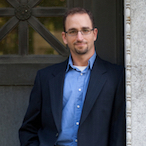Recently, I interviewed Jeffrey Hollender, co-founder and former CEO of Seventh Generation about his departure from the company, his new book, and what was next for him. Mr. Hollender is a humble hero of the green economy and a man whose work I've admired for years.
So it was with great pleasure that I dove into his new book, Planet Home, an extremely practical and useful guide to "cleaning and greening the world you care about most"--your home. The book runs through just about every part of your home: the kitchen, the bedroom, the nursery, kids room, family/living rooms, bathroom, utility rooms, laundry room, and home office, and gives the reader ways to save money while making the home healthier and more eco-friendly.
Mr. Hollender commented during our interview that, "There has never been a better time to start a mission-driven business." What jumped out at me from reviewing the book was not just how thoroughly the book covers every aspect of our home lives, but how this book was, in essence, an amazing business opportunity for aspiring green entrepreneurs looking to start a business that can have tremendous impact with little to no startup costs.
The book contains checklists on the safer and less safe ingredients for cleansers, recipes to make your own cleansers, cupboard staples everyone should have that can clean most things without harsh chemicals (i.e., who knew you could polish silver with natural toothpaste?), tips on healthy cookware (using cast iron contributes iron to your diet, whereas teflon is found in the blood of 98% of all people and not only has no useful biological properties but its primary ingredient, perfluoroctanoic acid or PFOA is "likely to be carcinogenic to humans"), and a very useful guide to safely prepping and storing foods called the "Leachin' Teach-In" which helps people avoid having chemicals leach into their food.
Unlike many 'tip'-centered books, Planet Home is a holistic treatise, keeping the big picture firmly in view. For instance, if you buy organic food and cut it on a cutting board made of plastic that you also clean with harsh chemicals, you're likely missing the big picture, and Hollender describes situations like this beautifully so that the reader can connect the dots.
If one were to follow the tips in the book and become educated about the holistic nature of their home-based activities, I imagine it would not only make them a lot healthier and contribute to a better world, but also save the person a lot of money.
I started thinking that someone could make a lot of money just taking what they've learned in this book and turning it into a home-greening consulting business. Think about it. Many people, even progressive ones, unfortunately, may not even know about this book. Among those that do and that buy it and read it, they might implement 1-5% of the activities in the book, and while they'll still be incredibly happy with the results, I can't help but think that they're missing Hollender's main point--that there is a holistic opportunity for greening and cleaning their lives through following this book's methods.
Enter the wily entrepreneur. Entrepreneurs could give healthy home audits, removing toxins from every part of the house and replacing them with eco-friendly, healthy, and energy efficient products. They could also educate the people house by house, showing them where the coils on their fridge are, and showing them how to clean them and how often.
There are a lot of people this book will really help to green and clean their homes. But the power of the entrepreneur to come in for a 3-4 hour consultation with a homeowner helps to magnify this impact and provide expert guidance to those who may not have the time or the know-how to do it themselves, or maybe just those who simply want to get the job done by someone else so they can spend more time enjoying their new green, healthy home with their kids and their pets…the ones that will truly benefit from Mr. Hollender's terrific book and his lasting legacy of thinking of future generations in the decisions we make.
---
Scott Cooney is the author of Build a Green Small Business (McGraw-Hill) and Principal of GreenBusinessOwner.com

Scott Cooney, Principal of GreenBusinessOwner.com and author of Build a Green Small Business: Profitable Ways to Become an Ecopreneur (McGraw-Hill, November 2008), is also a serial ecopreneur who has started and grown several green businesses and consulted several other green startups. He co-founded the ReDirect Guide, a green business directory, in Salt Lake City, UT. He greened his home in Salt Lake City, including xeriscaping, an organic orchard, extra natural fiber insulation, a 1.8kW solar PV array, on-demand hot water, energy star appliances, and natural paints. He is a vegetarian, an avid cyclist, ultimate frisbee player, and surfer, and currently lives in the sunny Mission district of San Francisco. Scott is working on his second book, a look at microeconomics in the green sector. In June 2010, Scott launched GreenBusinessOwner.com, a sustainability consulting firm dedicated to providing solutions to common business problems by leveraging the power of the triple bottom line. Focused exclusively on small business, GBO's mission is to facilitate the creation and success of small, green businesses.














